牛津译林英语9bunit1-welcome教案
牛津译林版九年级上册英语(新)教案:9A Unit 1 Welcom
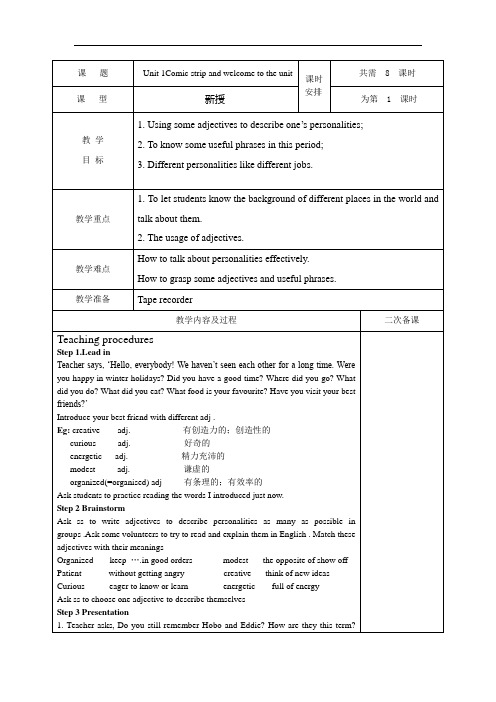
Neither my parents nor I think I can make a good accountant.
Use the conversation below as a model.
C.Explain andPracticeusing the following phrases and sentences.
keeps all her things in good order.
shows off
repeat grammar rules for us.
2.Ask some questions about it:
What makes generous people feelgood?
Is Eddie reallygenerous?
Why did Hobo eat up all the breakfast?
Step4Explanation
Explain the important phrases and sentences in the dialogue.
Help Millie complete the following sentences with the words in the box.
lie and her classmates are talking about their own personalities
and the kind of job they like or dislike.Work in groups and talk about yourselves.
Step4 Practice
1. Work in pairs and drill the dialogue.
牛津译林英语9bunit1-welcome教案

Get to know the countries in Asia.
1. Say “what country is east to China”.
Show some pictures about the country.(Japan)
2. Say “what country is northeast to China”.
Step7 Homework
1. Finish off the exercises.
2. Make up a dialogue to give suggestions on travelling.
教后记:
1)What happened to Hobo’s feet?
2)What was he doing then?
3)What did Hobo advise Eddie to do?
4)What was Eddie’s decision?
Get the students to read and practice the dialogue and then act the dialogue out.
Show some pictures about the country.(Korea)
3. Say “what country is north to China”.
Show some pictures about the country.(Mongolia)
4. Say “what country is southwest to China”.
2. talk about different countries in Asia.
3. learn some Chinese things.
牛津译林英语 9B Unit1Welcome to the Unit
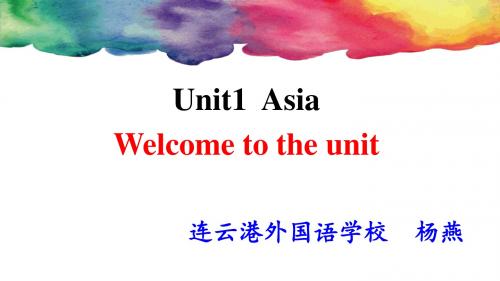
What about Kevin and Millie?
Did you visit Beijing before? Can you introduce the following places of interest?
Tian’anmeБайду номын сангаас Square the Summer Palace the Palace the Museum Great Wall the Temple of Heaven
Beijing.
What places did Millie suggest Kevin to visit? Tian’anmen Square, the Palace Museum and the Great Wall. What special things can they see in Beijing?
The Potala Palace
Mount Tai
West Lake
Three gorges of Yangtze river
• What may be Eddie’s favourite interesting places ? • Why ?
1. What are they doing? They are climbing the Great Wall. 2. Does Eddie think it is amazing to climb the Great Wall? Why? No. Because Eddie is tired and his feet hurt. 3. What is Eddie going to do? He will take a rest and wait Hobo back.
Homework
英语牛津译林Unit 同步教学设计(Welcome)
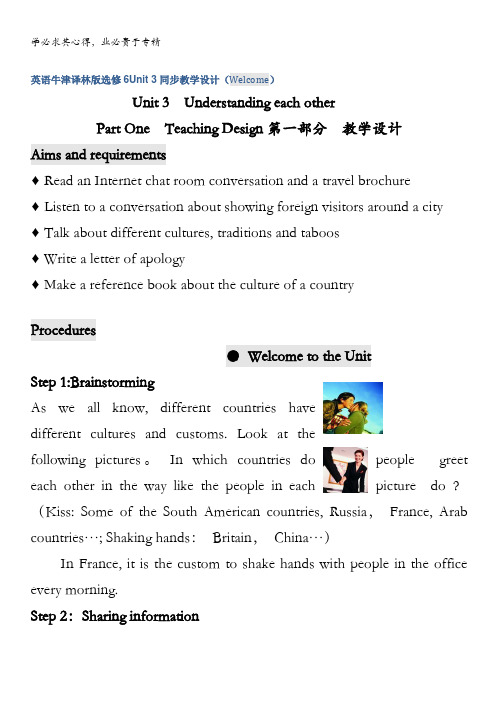
英语牛津译林版选修6Unit 3同步教学设计(Welcome)Unit 3 Understanding each otherPart One Teaching Design第一部分教学设计Aims and requirements♦ Read an Internet chat room conversation and a travel brochure♦ Listen to a conversation about showing foreign visitors around a city♦ Talk about different cultures, traditions and taboos♦ Write a letter of apology♦ Make a reference book about the culture of a countryProcedures●Welcome to the UnitStep 1:BrainstormingAs we all know, different countries havedifferent cultures and customs. Look at thefollowing pictures。
In which countries do people greet each other in the way like the people in each picture do?(Kiss: Some of the South American countries, Russia,France, Arab countries…; Shaking ha nds:Britain,China…)In France, it is the custom to shake hands with people in the office every morning.Step 2:Sharing informationLook at the following pictures and read the captions under them .Can you match the ways of greeting with the countries?Country/Area Ways of greetingHolland putting their hands together and bowing slightly Thailand kissing each other on one cheek and then the otherThe USA greeting each other by touching nosesSouth America hugging each otherThe Middle East shaking hands with each otherJapan bowing to each otherWhat about an Arab and a Japanese meeting for the first time?As a Chinese,if you are not familiar with greetings from other countries,what might happen?(Maybe we would feel embarrassed;we might be involved in awkward situations like…)Step 3: Discussion1.Do you know of any other ways of greeting that people around the world use?2.People in different countries greet each other in different ways。
牛津译林9BUnit 2 Welcome教学案
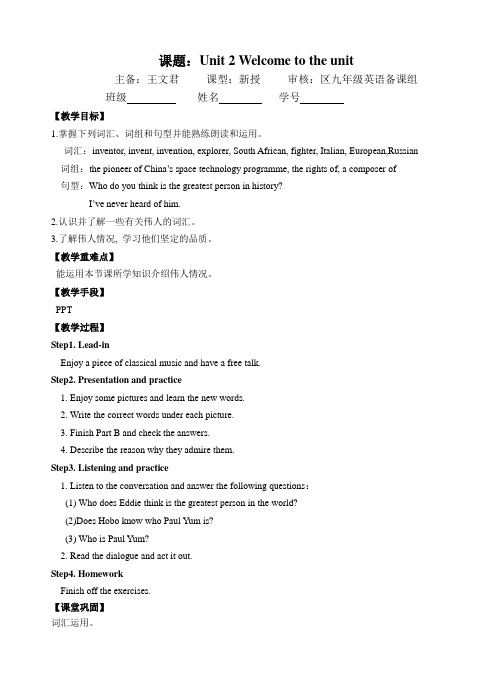
课题:Unit 2 Welcome to the unit主备:王文君课型:新授审核:区九年级英语备课组班级姓名学号【教学目标】1.掌握下列词汇、词组和句型并能熟练朗读和运用。
词汇:inventor, invent, invention, explorer, South African, fighter, Italian, European,Russian 词组:the pioneer of China’s space technology programme, the rights of, a composer of 句型:Who do you think is the greatest person in history?I’ve never heard of him.2.认识并了解一些有关伟人的词汇。
3.了解伟人情况, 学习他们坚定的品质。
【教学重难点】能运用本节课所学知识介绍伟人情况。
【教学手段】PPT【教学过程】Step1. Lead-inEnjoy a piece of classical music and have a free talk.Step2. Presentation and practice1. Enjoy some pictures and learn the new words.2. Write the correct words under each picture.3. Finish Part B and check the answers.4. Describe the reason why they admire them.Step3. Listening and practice1. Listen to the conversation and answer the following questions:(1) Who does Eddie think is the greatest person in the world?(2)Does Hobo know who Paul Yum is?(3) Who is Paul Yum?2. Read the dialogue and act it out.Step4. HomeworkFinish off the exercises.【课堂巩固】词汇运用。
2018年牛津译林9上Unit 1 Welcome to the unit 教学案-文档资料
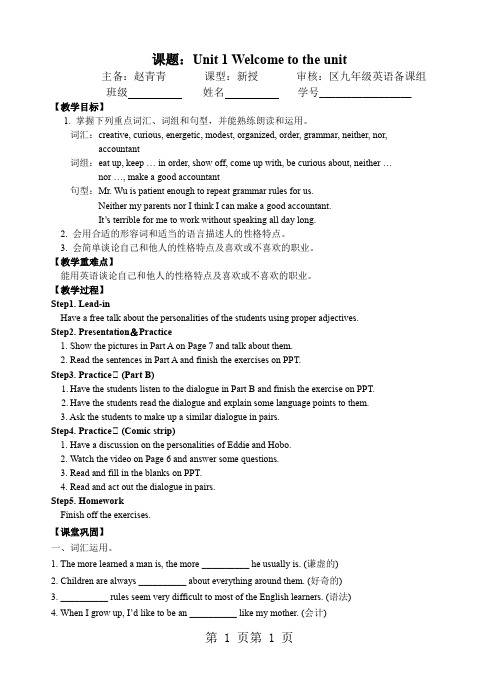
课题:Unit 1Welcome to the unit主备:赵青青课型:新授审核:区九年级英语备课组班级姓名学号_________________【教学目标】1.掌握下列重点词汇、词组和句型,并能熟练朗读和运用。
词汇:creative, curious, energetic, modest, organized, order, grammar, neither, nor, accountant词组:eat up, keep … in order, show off, come up with, be curious about, neither … nor …, make a good accountant句型:Mr. Wu is patient enough to repeat grammar rules for us.Neither my parents nor I think I can make a good accountant.It’s terrible for me to work without speaking all day long.2. 会用合适的形容词和适当的语言描述人的性格特点。
3. 会简单谈论自己和他人的性格特点及喜欢或不喜欢的职业。
【教学重难点】能用英语谈论自己和他人的性格特点及喜欢或不喜欢的职业。
【教学过程】Step1. Lead-inHave a free talk about the personalities of the studentsusing proper adjectives.Step2. Presentation&Practice1. Show the picturesin Part A on Page 7 and talk about them.2. Read the sentences in Part A and finish the exercises on PPT.Step3. PracticeⅠ (PartB)1.Have the students listen to the dialogue in Part B and finish the exercise on PPT.2.Have the students read the dialogue and explain some language points to them.3. Ask the students to make up a similar dialogue in pairs.Step4. PracticeⅡ(Comic strip)1. Have a discussion on the personalities of Eddie and Hobo.2.Watch the video on Page 6 and answer some questions.3. Read and fill in the blanks on PPT.4. Read and act out the dialogue in pairs.Step5. HomeworkFinish off the exercises.【课堂巩固】一、词汇运用。
中学牛津译林版9上册Unit1《Knowyourself》welcome教学设计
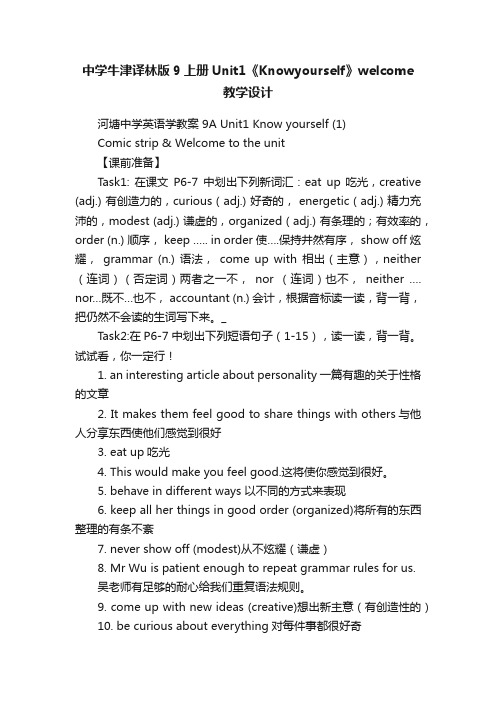
中学牛津译林版9上册Unit1《Knowyourself》welcome教学设计河塘中学英语学教案 9A Unit1 Know yourself (1)Comic strip & Welcome to the unit【课前准备】Task1: 在课文P6-7中划出下列新词汇:eat up 吃光,creative (adj.) 有创造力的,curious ( adj.) 好奇的, energetic ( adj.) 精力充沛的,modest (adj.) 谦虚的,organized ( adj.) 有条理的;有效率的,order (n.) 顺序,keep ….. in order 使….保持井然有序, show off 炫耀,grammar (n.) 语法,come up with 相出(主意),neither (连词)(否定词)两者之一不,nor (连词)也不,neither …. nor…既不…也不, accountant (n.) 会计,根据音标读一读,背一背,把仍然不会读的生词写下来。
_Task2:在P6-7中划出下列短语句子(1-15),读一读,背一背。
试试看,你一定行!1. an interesting article about personality一篇有趣的关于性格的文章2. It makes them feel good to share things with others与他人分享东西使他们感觉到很好3. eat up吃光4. This would make you feel good.这将使你感觉到很好。
5. behave in different ways 以不同的方式来表现6. keep all her things in good order (organized)将所有的东西整理的有条不紊7. never show off (modest)从不炫耀(谦虚)8. Mr Wu is patient enough to repeat grammar rules for us.吴老师有足够的耐心给我们重复语法规则。
(牛津译林版)高中英语模块十Unit 1教学课件:Welcome

Possible solutions to the problem
1. stop wars 2. give medical care and training
3. improve local envirotional training
5. donate food and money
What problems may developing too fast
cause? Developing too fast might harm the natural environment. For example, many trees have been cut down in order to build factories, roads and bridges. Also, almost everything we do in our modern lives, be it cooking or traveling, requires the use of Earth’s natural resources, which we may run out of one day.
What has happened to the village?
It has become a city. With the development of society, many villages have changed a lot over the years. Tall building have been built and motorways and bridges have been constructed. The living conditions of local people have been greatly improved. Small villages have been developed into towns or cities.
牛津译林版九年级英语上册Unit1KnowyourselfWelcometotheunit教学设计
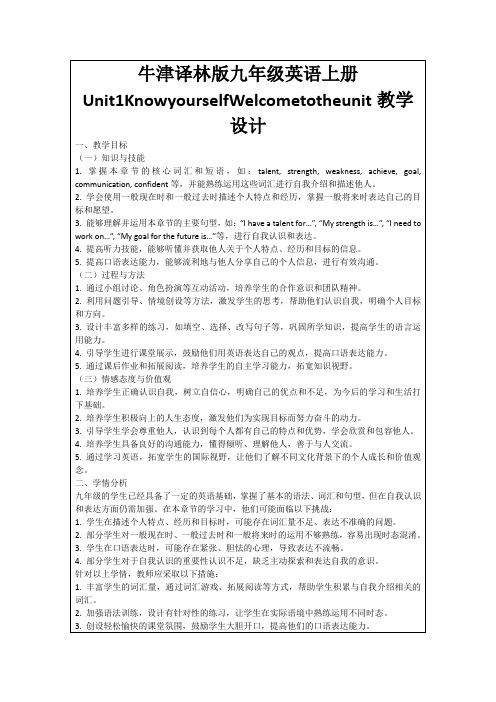
3.引导学生学会尊重他人,认识到每个人都有自己的特点和优势,学会欣赏和包容他人。
4.培养学生具备良好的沟通能力,懂得倾听、理解他人,善于与人交流。
5.通过学习英语,拓宽学生的国际视野,让他们了解不同文化背景下的个人成长和价值观念。
二、学情分析
4.引导学生认识到自我认识的重要性,激发他们主动探索和表达自我的兴趣。
三、教学重难点和教学设想
(一)教学重难点
1.词汇和短语:本章节的核心词汇和短语是学生需要掌握的重点,如talent, strength, weakness, achieve, goal等。这些词汇的准确理解和运用将直接影响到学生自我介绍和描述他人能力的表达效果。
3.语法讲解:结合实际例子,用简洁明了的语言解释时态的用法,并通过互动问答,确保学生理解到位。
4.口语练习:组织角色扮演、小组讨论等活动,让学生在实际对话中练习使用所学词汇和时态,提高口语流利度。
5.写作训练:布置个人介绍、未来目标规划等写作任务,指导学生运用所学知识进行书面表达。
6.情感教育:通过课堂讨论、分享会等形式,引导学生认识到每个人都有独特的价值,培养他们的自信心和同理心。
3.设计丰富多样的练习,如填空、选择、改写句子等,巩固所学知识,提高学生的语言运用能力。
4.引导学生进行课堂展示,鼓励他们用英语表达自己的观点,提高口语表达能力。
5.通过课后作业和拓展阅读,培养学生的自主学习能力,拓宽知识视野。
(三)情感态度与价值观
1.培养学生正确认识自我,树立自信心,明确自己的优点和不足,为今后的学习和生活打下基础。
设计意图:通过拓展阅读,拓宽学生的知识视野,提高他们的阅读理解能力。
牛津译林9BUnit 2 Welcome教学案
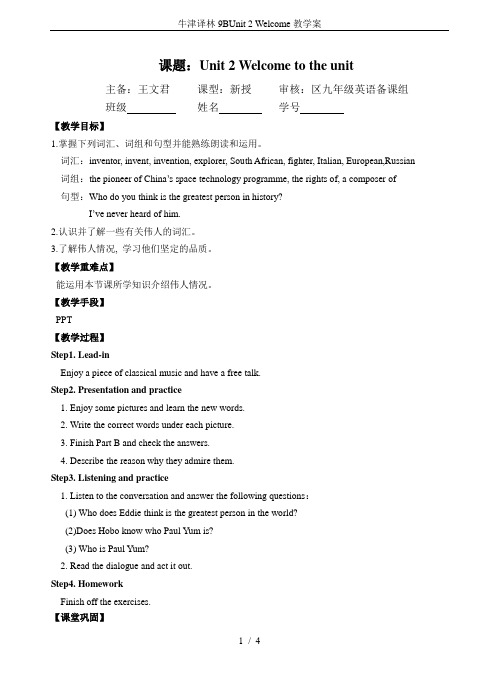
课题:Unit 2 Welcome to the unit主备:王文君课型:新授审核:区九年级英语备课组班级姓名学号【教学目标】1.掌握下列词汇、词组和句型并能熟练朗读和运用。
词汇:inventor, invent, invention, explorer, South African, fighter, Italian, European,Russian 词组:the pioneer of China’s space technology programme, the rights of, a composer of 句型:Who do you think is the greatest person in history?I’ve never heard of him.2.认识并了解一些有关伟人的词汇。
3.了解伟人情况, 学习他们坚定的品质。
【教学重难点】能运用本节课所学知识介绍伟人情况。
【教学手段】PPT【教学过程】Step1. Lead-inEnjoy a piece of classical music and have a free talk.Step2. Presentation and practice1. Enjoy some pictures and learn the new words.2. Write the correct words under each picture.3. Finish Part B and check the answers.4. Describe the reason why they admire them.Step3. Listening and practice1. Listen to the conversation and answer the following questions:(1) Who does Eddie think is the greatest person in the world?(2)Does Hobo know who Paul Yum is?(3) Who is Paul Yum?2. Read the dialogue and act it out.Step4. HomeworkFinish off the exercises.【课堂巩固】词汇运用。
牛津译林版9AUnit1Welcome课件 (共47张PPT)
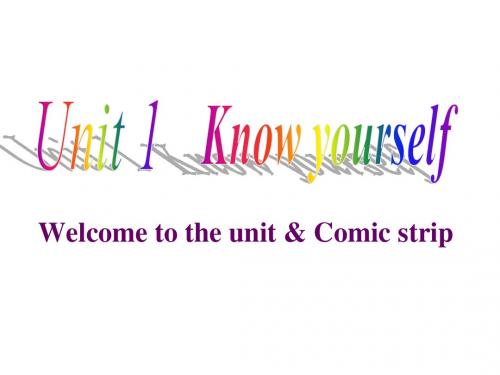
Step 1: Show studying aims
1. To learn to describe people’s 2. personalities 2. To learn to talk about your own
personalities and the kind of job you like or dislike 3. To learn the new words and expressions
Personalities
Some words are often used to describe people’s personalities. Help Millie complete the following sentences with the words in the box.
creative curious energetic modest organized patient
work without speaking all day long
19.有不同能力的人 people with different personalities 20.以不同的方式 in different ways
Step 5: Detection and feedback (检测反馈)
Ⅰ.根据句意及首字母或汉语提示完成单词 1. Daniel is clever, but he never shows off. He is omdest.
Sb be + adj. + enough to do sth.
某人足够…可以…
• Samuel is _c_r_e_a_t_iv_e_. He often comes up with new ideas.
最新牛津译林版九年级上册全册教案unit1.doc
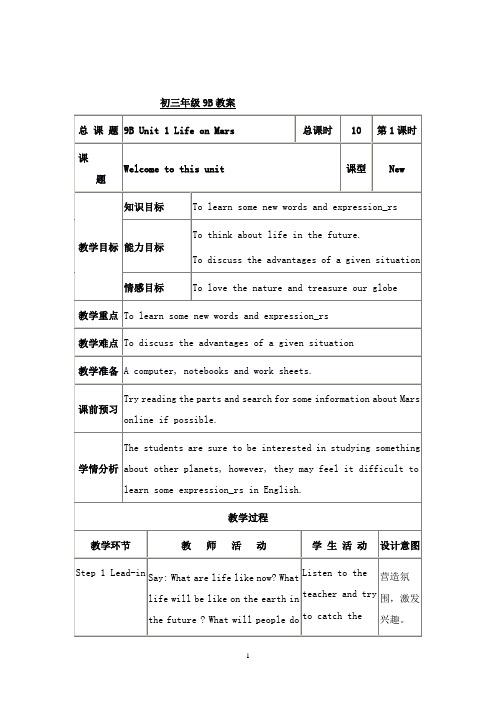
Step 8
Homework
Say: What are life like now? What life will be like on the earth in the future ? What will people doin the future?
Show some pictures :Review “robot ”, “helmets”, “pills” and complain Mars
1.苹果太高了,我够不到。
The apples are too high for me to get to.
2.吉姆一直学习用功,因此他能在班上(成绩)达到顶峰。
Jim always studies hard so he can get to the top in his class.
3.如果这些孩子的母亲去世了,谁来照料他们?
To recognize and understand vocabulary about life on Mars.
营造氛围,激发兴趣。
注重基础,突出要点
合作学习,提高能力
听说并存,加强训练。
及时巩固,加深印象。
板书设计
教后感
初三年级9B教案
总课题
英语:unit1 scool life-welcome教案(牛津译林版必修1)

Welcome-Unit 1 School LifeAims and requirements♦ Read a magazine article about school life in the UK and two other articles about school clubs♦ Listen to a headmaster talking about school activities♦ Discuss daily school life with your class partner♦ Report your school activities to your class teacher♦ Write a notice about school activities♦ Make a poster for a new school clubprocedures●Welcome to the unitStep 1: BrainstormingIt’s the beginning of a new term. You have just finished junior high and are about to enter a new period in your studies. I am very happy to have all of you in my class and I hope we can be friends. I can see that some of you are eager to know what studying at senior high will be like. Will it be different from junior high? Well, there are certainly many differences between junior high and senior high, but there are also some things that are the same in every school in China. What about schools in other countries? Do students learn differently and have different experiences? Are schools all over the world the same?This is the subject of our first unit. Today we are going to look at schools in the United Kingdom and try to work out if they are the same or different from schools in China. Here are four pictures that show some aspects of school life in the UK. Please look at the pictures, read the instructions and try to determine the differences between schools in China and the UK.Step 2: Discussing and practicingLet’s have a discussion for several minutes.(The teacher can u se the following contents to help students.)Huge campus and low-rise buildings: In the United Kingdom,we can see huge campus andlow-rise buildings in this picture. It is the biggest difference from schools in China. Schools in China usually have a large enough campus to make sure students have enough space to study and play in. But most school buildings are taller, at least three storeys.Lockers for every student: In the United Kingdom, there are rows of lockers by the classroomsfor students to put their stationery, books, exercise-books and other belongings.In China students bring what they need for lessons to school and then take it all back home after school. Most schools in China do not have the equipment in the classroom.Fewer students in each class:In the United Kingdom, there are fewer students in a class, no moreNow try to combine your own school experiences with knowledge gained from this text and other sources, so that you can participate fully in the discussion.(Give students a couple of minutes to talk about the following three questions.)1. Do you know any other differences between the lives of Chinese and British high school students?2. What kind of school activities do you enjoy?3. What is your dream school life like?Now in groups exchange your opinions and everyone is supposed to speak out your idea. Each group will then report your conclusions to the whole class.。
牛津译林版英语9B Unit1 welcome to unit课件(共30张PPT)

Part A
dragon dance
Chinese opera
chopsticks
Chinese knot
Chinese paper-cutting
kung fu
Group work Have a discussion
• What place do you want to visit most in China?
1. 休息一下 2. 在你返回的路上
take a rest on your way back
3.It It is tiring to climb the steps.
形式主语
真正的主语
it作为形式主语的用法 观察下面例句,然后补全结论部分所缺的内容。 1.It is tiring for Eddie to go climbing with him. 2.It is generous of him to share his candies with us. 【结论】 句型:It is + 形容词 +(of/for sb.)+ to do …
Practise reading
Kevin: I'm planning to travel around China. Where shall I visit first? Millie: Since you're in Beijing now, why don't you start from here? Tian'anmen Square,the Palace Museum and the Great Wall are wonderful places to go. Kevin: Good idea. What special things can I see in Beijing? Millie: Chinese opera is a kind of traditional Chinese art, and Beijing opera is one of the most popular. You can go and enjoy it.
牛津译林版九年级下册英语Unit 1 Welcome教案

牛津译林版九年级下册英语Unit 1 Welcome教案班级姓名学号【教学目标】1. 掌握下列词汇、词组和句型并能熟练朗读和运用。
词汇:tiring, step, chopsticks词组:a long way to go, had better keep moving句型:Wow, the Great Wall is amazing, isn’t it?It’s tiring to climb the steps and my feet hurt.Wake me up on your way back.2. 探讨中国风格的事物,简单了解其情况。
3. 用英文简单介绍北京的一些风景名胜。
【教学重难点】能用英语介绍中国的一些风景名胜。
【教学手段】PPT【教学过程】Step1. Lead-inHave a free talk.Step2. Presentation1. Introduce and present some Chinese things.2. Have the students finish Part A.Step3. Listening and practiceⅠ1. Present some Chinese places.2. Have the students listen to the tape, and then answer two questions.3. Have the students read Part B in roles.4. Ask students to make up a new dialogue.Step4. Listening and practiceⅡ1. Have the students listen to the tape, and then answer some questions.2. Have the students read and act.Step5. HomeworkFinish off the exercises.【课堂巩固】一、词汇运用。
- 1、下载文档前请自行甄别文档内容的完整性,平台不提供额外的编辑、内容补充、找答案等附加服务。
- 2、"仅部分预览"的文档,不可在线预览部分如存在完整性等问题,可反馈申请退款(可完整预览的文档不适用该条件!)。
- 3、如文档侵犯您的权益,请联系客服反馈,我们会尽快为您处理(人工客服工作时间:9:00-18:30)。
Get to know the countries in Asia.
1. Say “what country is east to China”.
Show some pictures about the country.(Japan)
2. Say “what country is northeast to China”.
1.Show the pictures about Chinese thingssuch as:dragon dance,Chineseopera, chopsticks,Chinese knot,Chinese paper cut andChinese kun to talk about the pictures.
Ask:How does Mille learn about the worldwhy
How does Simon learn about the wwrld Why
Work in pairs to practice the dialogue.
Sample conversation :
S1:How do you learn about the world
2. talk about different countries in Asia.
3. learn some Chinese things.
重点难点
1.Learn to introduce some famous thingsin Beijing in English.
2.Talk about different countries in Asia.
Talk about the places of interest in China.
Step6Consolidation
Write a short passage to describe one of the famous places in China and choose a piece of writing to read in class.
3.Encourage the students to say more about Chinese things.
4.Get the students to talk about some famous Chinese things.
Step5Practice
Finish the exercises in Part A.
Show some pictures about the country.(Korea)
3. Say “what country is north to China”.
Show some pictures about the country.(Mongolia)
4. Say “what country is southwest to China”.
教师教学活动内容、方式
学生活动
复备
Step1 Lead-in
Talking about the places of interest in Beijing.
1. Show some pictures to the students. Get them to guess what it is.
2. Encourage the students to describe them.
1)What happened to Hobo’s feet
2)What was he doing then
3)What did Hobo advise Eddie to do
4)What was Eddie’s decision
Get the students to read and practice the dialogue and then act the dialogue out.
课题
9B Unit 1 Asia
Comic strip﹠Welcome to the unit
教学目标
After learning this period , the students should be able to
1.learn more interesting places in China.
Show some pictures about the country.(India)
Encourage the students to say something about these countries.
Step4Showing and discussion
Get to know Chinese things.
Step7 Homework
1. Finish off the exercises.
2. Make up a dialogue to give suggestions on travelling.
教后记:
Step2Listen and read
Tell the students that Eddie and Hobo are visitingthe Great Wall.
a.Get the students to listen to the tape and find out what happened.
